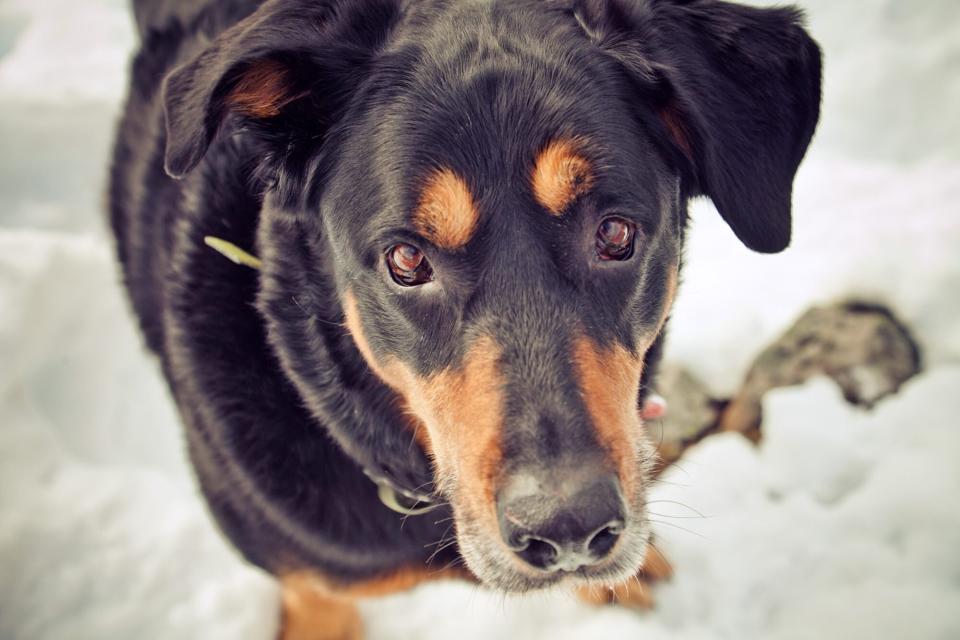Do Dogs Get Colds?
Dogs can get colds, but it's not the same as human colds. Rhinoviruses are the most common cause of human colds, while dogs tend to get bacteria such as Bordetella bronchiseptica and viruses such as the parainfluenza virus (different from canine or dog flu). You may hear dog colds also called canine cough or kennel cough. Most of these infections are due to a combination of infectious agents, not just one.

Christopher Kimmel / Getty
Can Dogs Get Colds from Humans?
Luckily many respiratory and cold viruses are "species specific," so you won't share your colds with your dog and vice versa. There have been cases with the recent COVID-19 pandemic where people have infected their dogs with the coronavirus, but that is very uncommon, and in most cases the dogs have a mild infection. Still, if you test positive, it would be best if someone else could care for your pets until you are better.
RELATED: Coronavirus and Pets: Here's What You Need to Know
Dog Cold Symptoms
Signs of a cold in dogs are very similar to the signs in humans. It is sometimes difficult to differentiate a cold from other respiratory infections or the flu, though these are the most common symptoms.
Sneezing
Coughing (A dry "honking" cough could mean kennel cough specifically)
Runny nose
Discharge from the eyes
Lethargy; less active than usual
Loss of appetite or thirst
Trouble breathing
Fever (though a fever more commonly indicates the flu)
If your dog stops eating and drinking, has trouble breathing, or develops a fever, he needs to visit your veterinarian. Let them know ahead of time that he is coughing, as many of these infections are very contagious to other dogs.
How to Treat Your Dog's Cold to Get Rid of It Fast
Most dog colds can be managed at home as long as your dog is breathing normally and eating and drinking. Consider feeding foods with some added liquid such as low-sodium chicken or beef broth. Just like us, fluid intake is important so your dog stays hydrated. Make sure there is fresh, clean water available all the time. Your dog's sense of smell will be affected, so offer foods with strong odors to encourage him to eat. Pouring the juice from a can of tuna on his regular food is one way to increase odors.
Some dogs will benefit from being in the bathroom while you shower. This helps to "steam" your dog's sinuses and loosen up some congestion. Consider switching from walking your dog on a collar to using a harness so his trachea is not irritated. Keep your dog quiet so his trachea and lungs can heal—no running or wild play. Keep a watchful eye on your other dogs as they may develop symptoms, too.
Clean any discharge off your dog's eyes and nose at least twice daily and use a warm compress to soften any dried discharge.
If the cough continues and your dog can't rest comfortably, ask your veterinarian for some cough medicine for relief. Some human medications are not safe for dogs, and there are canine-specific cough remedies available instead. However, do not use any of these without checking with your vet first!
A fever and/or labored breathing means this is more than "just a cold." Your dog might be developing pneumonia. He needs to go to the veterinary hospital as he may need antibiotics and supplemental oxygen therapy.
Preventing Colds
The best way to prevent your dog from catching a cold is to limit his exposure to other dogs, especially in indoor situations. Realistically, your dog may go to doggy daycare, training classes, or get boarded at some point. Many facilities will require vaccinations for respiratory illnesses such as Bordetella, parainfluenza virus, or canine flu, and current vaccinations will minimize your dog's risk and often keep symptoms milder if he does get sick.
RELATED: First-Year Puppy Vaccination Schedule Chart to Follow

